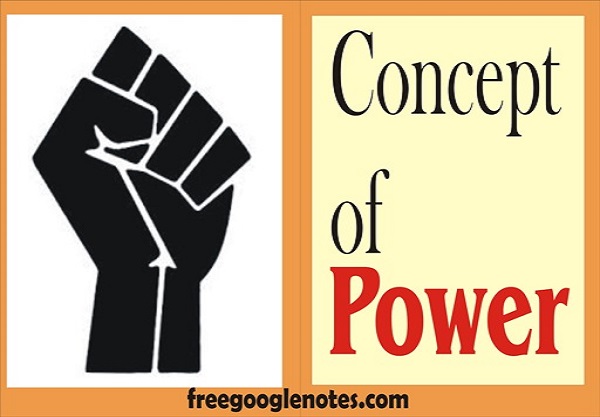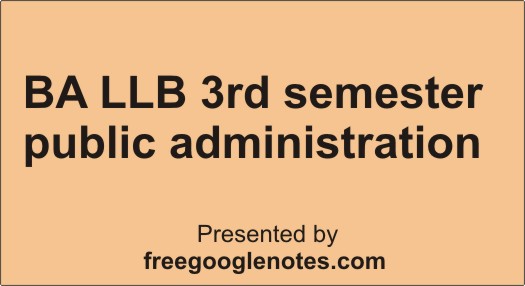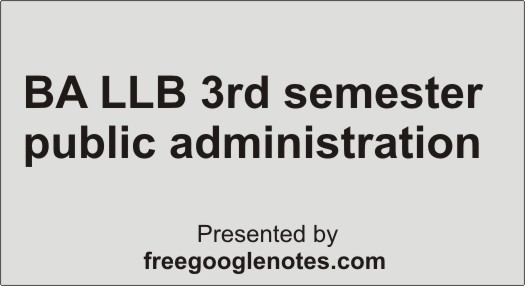Table of Contents
BA LLB 1st semester political science notes
In this post you will
BA LLB 1st semester political science notes
on the topic Concept of power
for more you can follow @blogger_priya
or
you may also like:-
BA LLB easy notes 1st year 1st semester complete course
The Concept of power

Q.1 what do you understand by term ‘power’? Discuss its nature and scope.
Ans. Concept of power
As usual, there is a lack of consensus on the meaning, scope, and nature of the concept of power. Power broadly can be seen, (i) generally as a phenomenon found in the whole social order,
community, or nation, or, (ii) in particular, in individuals and other macro units. Webber defines power (Macht) as the probability that one actor within a social relationship will be in a position to carry out his own will despite resistance regardless of the basis on which this probability rests. Therefore, he conceives the state as a compulsory political association if and in so far as its administrative staff successfully holds a claim to the monopoly of the legitimate use of physical force in the enforcement of its order. According to M. G. Smith, power is the capacity to take autonomous action in face of resistance (contraposition and confrontation) from persons, groups, rules, or material conditions. It is ‘the ability to pursue one’s will effectively, is necessary by imposing it on others’.
Callin explains his ‘power ‘hypothesis’ that everyone wants to execute one’s will. Through the execution of one’s will, a man wants to realize his particular wish or end. Conditions or freedom to realize one’s wish or end is power. Power, therefore, its ‘ability to be free in effecting one’s own will ard to control, whether exercised or not exercised, but potential. It is the potentiality of effective action which imposes one’s will upon the behavior of others even against opposition. Catlin regards influence as a potential power. Force is a kind of guarantee of control and violence is the force we morally condemn. Control lies in the success. For him, unsuccessful power is not power. George
Schwarzenberger also regards it as ‘capacity to impose one’s will on others by reliance on effective sanctions in case of non-compliance’
Catlin puts emphasis on actor’s potentiality of effective action, and is not satisfied with Weber’s ‘probability or possibility. Potential is actual power. To him, mere protests or legal power does not suffice. Political Science studies the phenomena of control or control relationship of human wills. It is study of the science of power’ or of ‘government which for him means control. His systematic theory places ‘power’ in the central focus.
Rowe includes power and authority under the generic phenomenon of ‘influence’. But he finds vital difference among them. According to him, the basis of power is might. Sanctions exist behind the gamut of power. These sanctions pertain to the exercise of force or coercion. When authority or influence becomes ineffective, coercive sanctions are used. Both power and coercion are closely related, but are not identical or co-extensive.
Lasswell along with Kaplan has tried to analyze power in a detailed and scientific manner. The concept of power is, according to them, perhaps ‘the most fundamental in the whole of political science. The political process is the shaping, distribution, and exercise of power. Power in general should be distinguished from its specific form as applied in politics. Political power is power over other men. Lasswell puts power under the generic concept of ‘influence’. According to him, the study of politics is ‘The study of influence and the influential’. He subsumes power under ‘influence’. He is interested in studying influence related to the distribution of values in general, and the influential persons or elite in society. Influence is the value position and potential of a person or group. Power, according to him, is ‘participation in decision-making’. Power is a value in its own right as well as a means in the realization of other values. Exercise of power and influence can be based either on coercion or persuasion. Lasswell connects power with severe deprivations: ‘Power is a special case of the exercise of influence.’ It is the process of affecting policies of others with the help of severe deprivations for non-conformity with the policies intended. Catlin is not satisfied with Lasswell’s conceptualization to influence. Influence is not government. It is control which makes power effective. Control looks to the results, not to modes or processes. But power does not include the whole matrix of social relations.
Bierstedt explains it forms a broad sociological perspective. Society is ordered relationship among individuals, groups, and organizations. Interactions among them are structured and organized. ‘The element he observes, “that underlies these systems of organized interactions is
power.’
YOU MAY ALSO LIKE:-
Social Stratification Sociology 1st semester notes
ba llb 1st Semester Notes Pdf
Social Status Full Explained Overview Part-1
Social Status And Role Pdf Covering All Topics 2020 Part-2
ba llb notes for 1st sem sociology.
It supports the basic order of society and the social organization operating within it. Without power, there is no organization or orders Where there is organization or order, there is power. According to the power is always latent. It is the ability to employ force, not its actual employment’. Power is the capacity to apply sanctions, not their actual application. It is the ability to introduce force in a social situation. From this point of view, it is the predisposition or prior capacity which makes the application of force possible. Unlike force, it is always successful. When it is successful in the form of the exercise of force, in principle, it ceases to be power. Power is latent. Force and authority are its expressed forms. Force involves an exercise of sanction, such as, reduction, or total elimination of alternatives to persons or groups. Therefore, power is neither force nor authority, but the latter two are intimately related to power.
Several German thinkers like Heinrich von Treitschke, Friedrich Nietzsche, etc., related power to the state, and developed power theory of the state’. The essence of the state is, according to Kauffman, development, increase, and display of power with the will successfully to maintain and assert itself. In war, according to such scholars, the state reveals itself in its true essence. For them, a naked display of force was power.
Bertrand Russell and many other pacifists have decried the role of power. Russell, using in its widest sense, has stated it as ‘production of intended effects upon the outer world, whether human or non-human.’ The concentration of political power in the state is destructive of human
initiative and freedom. He is opposed to all organized life and regards : authority in any form as anti-thesis of liberty. Power harms, those who
hold it as well as those on whom it is exercised. It intensifies the passion of rivalry making one more bellicose. His arguments though based on psychological analysis of human nature, yet are ethical and philosophical in nature. It is impossible for man to lead a social life without an organized society.
Older thinking on sovereignty, leaving its legalistic and justice aspects, can also be seen from a power perspective. According to Laski, the study of politics concerns itself in relation to organized states. The basis of state-sovereignty is the contingent power to use the armed forces of the state to compel obedience to its biddings. He accepts,that there are many limitations on the exercise and sources of power.These limitations belong to history, tradition needs to secure assent, methods of securing assent, the influence of political evolution, the pressure of
roups, religion, ethics, etc. Dorothy has also dealt with ‘sovereignty under the title “The Problem of Power in the State’.
Power: Nature, Scope and Forms
The phenomenon of power can be seen with two views : (a) broader, and (b) narrower. Machiavelli, Hobbes, Graham Wallas, German thinkers, the ancient Indian school of danda’, etc. belong to a broader view of power. They regard power as an independent variable or element of political life. Catlin does not regard it as an end in itself. But others regard all other variants of influence as different forms of power. The narrower view demonstrates popular approval and commonsense.
Power is the fundamental basis of politics. It has been described as a common urge or inclination of mankind. As Catlin opines, none sacrifices his freedom to do whatever he chooses or his long-cherished liberties: ‘None yields his power except from fear, from the conversion of his desires to the ends, and for the particular power to attain these new ends. Hobbes wrote, “I put for a general inclination of all mankind, a perpetual of the restless desire of Power after Power, that ceaseth only in Death.’ Power over men and material is a means for specific security and control. His is the concept of Homopoliticus or the political man, who demands the maximization of power in relation to all other values. He believes in power to determine power and incessantly strives to attain it. According to Michels, such a man ‘will almost always endeavor to consolidate it and to extend it. However, it is an ideal type’ or ‘pure’ concept which when applied in practice has to be modified substantially. At times, people sacrifice power for the sake of non-political values, but they do so in individual or exceptional cases. But that aspect of power has also to be kept in mind.
Power is social and relational. It is sociological in its origin always attached to a person, a group, or an association. Power is power because of prevailing values, interaction patterns, and procedures or modes of attaining them. It lies in specifics and partimajor forms of power on the basis of the extent to which behavior is influenced. It is (i) force, (ii) domination, and (iii) manipulation. In force, one influences the behavior of subordinated individuals by physical manipulation like assault, confinement, etc. In domination, he influences their behavior by making explicit to others what he wants them to do, such as, by command, request, etc. In manipulation, he influences the behavior of others without making explicit the behavior which he thereby wants
them to perform, such as, by utilizing symbols.or performing certain acts as in propaganda. Legitimacy is the ‘right to rule’. When subordinated individuals recognize that right, the power exercise, power-holders is regarded as legitimate power. In case, it is recognized by them, but exercised, it becomes coercion. Legitimate power further appears in three major forms. It is legal when the subordinated individuals recognize it on the basis exercised of a belief in the legality of the laws, decrees, and directives given by the power-holder When the recognition of legitimacy rests on a belief in the sanctity of traditions by virtue of which the power-holder exercises his power and in the traditional sanctity of the orders which he issues, it becomes traditional legitimacy. Charismatic legitimacy rests on the devotion of subordinated individuals to the personal qualities of the power-holder A power-holder whose authority is recognized as legitimate can exercise
any form of power, such as, force or domination.
From the viewpoint of the flow of power-relationship, power can be unilateral, bilateral, multilateral, and bargaining. It is unilateral if only one party to that relationship exercises power over the other. When two parties exercise power over each other, it becomes bilateral, as in
case of a bargaining event. In multilateral power-relations, many parties. Fiel mutually tries to influence each other’s behavior. When the power-holder
alters the behavior of others without bringing in any intermediary, the exercise of power is called direct. When it is exercised through subordinates or intermediaries, it is regarded as indirect. From the point of view of control or autonomy, power can be concentrated or diffused.
When power is exercised through a large number of subordinate units, bil tends to become diffused as the power-holder is rarely able to exercise
control over them. The subordinates begin to exercise some amount independence and take initiative. Power is concentrated when the power-holder exercises ways and means to have control over it.
Q.2. Define the term ‘power’ Discuss its different kinds and sources.
Ans. Power is one of the most serious problems of Political Science It was a serious problem in the past and continues to be so at pres Different thinkers have expressed their views on the subject, including Bertrand Russell, George Catlin, Harold D. Lasswell and others. thinkers have differing views. The concept of power however, gradually and slowly developed
Origin of the Concept of Power. In Political Science, the concept of
Power is very old. In the past it was discussed by Plato and Aristotle in general but realistic approach was given to this concept by Hobbes and Machiavelli, In the past some thinkers believed that it was vested with a community or in the state, while others believed that it was only vested in the individual. The concept of power at the international level came into consideration after the emergence of States. In fact, there is no political thinker who has either directly or indirectly not discussed Power. Maciver is of the view that everything which is happening around us is, in some way or the other, concerned with power. It has also been said that power is essential for maintaining good order and that where there is power, there is proper law and order situation for running of management on sound footings. Behind every organization there is power and that must be. Without power, there can ever think of proper functioning.
In our modern times, some of the thinkers have tried to make power concept as mystery and so on. It is, however, very clear that power is to be seen everywhere both at local, national, and international levels and is of considerable importance and significance. The power is used at all levels. Some of the thinkers who have tried to discuss and analyze power on the basis of sources, aims, methods, and influences.
Russell’s Views about Power. Power Theory of the State was first advocated in Germany in 19th century by historians like Heinrich von Treitschke ‘and philosophers like Friedrich Nietzche. In 20th century this was developed by Erich Kauffmann that the main aim of the State is to successfully assert and exert itself. The State must have highest power and the development of talents was only secondary and not its primary object. In its true sense, the State expresses itself in war and the extent to which it comes out victorious. But these ideas that the success of a State was linked with its achievement was not cherished by many European thinkers. Charles Merriam came forward with the idea that the power should be distributed as widely as possible. This was also bitterly condemned by Bertrand Russell. According to him concentration of power in State was bound to kill human initiative. An organized life, according to him, was an obstruction to free creativity. Power and its extension was the extent of saying that power was dangerous not only for those on whom it is used, but also for those who use it. In his Practice and Theory of Bolshevism,’ he has said that, “Habit of power intensifies the passion or instinct of rivalry; therefore a state in which Power is concentrated will be more bellicose than the one in which power.
is diffused.” According to him the methods of violence which the communists used in achieving their ends were dangerous. He wanted that the power should never be got concentrated in the hands of only a few persons.
Definition of the Term ‘Power’. Power is not something absolute, but only relative and used in relation to something else. If a person has power, obviously, it is essential that there should be people who are prepared to accept its use as well. In case there are no people to accept power, it is all immaterial, whether the person enjoys or possesses power or not. Thus it can not be unilateral and must be bilateral. For acquiring power, it is most essential that the demands, needs, and desires of all those on whom the power is to be subsequently used must be taken into consideration, Power depends on circumstances and position as well. A teacher may exercise power on a student while in school, but not on him when he has left the institution joined social life. Similarly, an officer might use power and authority on his subordinates, but they may not accept his power when he has left the position. Power depends on the use as well. The monarch in England and President in India have constitutional powers, but how far they use them makes the power effective. Similarly, the President in USA to has powers, but his position depends on their use. In view of this, different thinkers have given definitions of the term power as suited to their viewpoint. Robert Dahl is of the view that ‘power’ is synonymous with ‘Politics’. According to him if we try to measure the ‘power’ of an individual by his powerful personality that will perhaps not be correct. A person might influence others without wealth, while the other may not influence even after possessing all wealth. Robert Biersted has said that ‘power is the capacity to use force’ Haus J. Morgan then is of the view that the main aim of power is to establish control over the people and to continue that. Catlin in his Systematic Theory has said that everyone wants to fulfill his desires and achieve objects, which can be attained only with the help of freedom, and power is an essential condition for it. In this way, different definitions of the term power have been given. As will be seen from all these
definitions, it is accepted uniformally , that power is essential for maintaining harmony and freedom and it needs both those who have power and on whom the power is to be exercised.
Closely related to the definition of power is its concept. This concept is quite old in so far as Political Science is concerned. S.S. Ulmer in his “Introductory Reading in Political Behaviour’ has said that
of all the social science, none has been more concerned with the concept of Power than Political Science. A concept analysis of the political writings of Aristotle to the present would no doubt reveal power as the central concept around which attempt to explain politics have revolved.” In his writings, Montesquieu suggested that ‘Power’ was a central point for the study of Political Science. Lasswell and Kaplan are of the view that “The concept of power is perhaps the most fundamental in the whole of Political Science; the Political process in the shaping, distribution, and exercise of power.”
Kinds of Power. Though it might appear that power is something simple, actually that is not so. The power can be of various kinds and different types. It can be based on force, sovereignty, or cleverness. Similarly, its basis can be constitutional or traditional. Power can also be directed as well as indirect. Similarly, it can be single-sided as well as both sides. But whatsoever may be the type of power, every powerful person will try to show that he is acting reasonably and that all his actions are justified. When his argument or reasonability is accepted by those who are subordinate to him then that is called reasonable, but when that is not socially accepted and still used that is called repression or suppression. Then this reasonable power can be constitutional when his laws and desires are legally and constitutionally accepted as reasonable. But when the base of power and its acceptance is only. tradition, then that is called traditional power. But sometimes it may also happen that the basis of power and its acceptance can be only personal qualities of the ruler as well. But when a powerful person tries to use his power, and that is not considered justified or reasonable by society, then he can use force, superiority, and cleverness as well, so that he continues to use his power. He can directly use his force or indirectly through public servants. Usually, a powerful person has a class of people, who are empowered to use force, and at the time of need and necessity, these people are put into service. These people can be both officials as well as unofficial.
In so far as cleverness is concerned, it may not be always justified, but it is also equally wrong to say that it is unjustifiable under all circumstances. Sometimes, a powerful person may try to be successfully clever for remaining in power and maintaining his position, When only one side uses force on the other, that is called only one-sided force, but when on the other hand both the sides use force on each other,
that is called both sided use of force. In the former case the example
of a soldier, who obeys the orders of his superior, without any hesitation or questionings can be covered, whereas in the latter category the examples of those powerful authorities can be quoted, who are equally powerful and bargain with each other. Similarly the power can also be divided on the basis of use also. When power, is used by the powerful himself directly that is called direct power, whereas, when the power is used indirectly i.e. through other persons, that is called indirect power. The power based on repression and suppression cannot remain or last for long.
Sources of Power. Power was used in the past and even in our modern state use of power and force is quite visible. As long as the people are selfish and keep their own interests above everything else the use of power and force, will not only be desirable but also needed. Power however, flows many sources. Some such sources are :
1. Knowledge. The first important source of power is knowledge. It is with help of knowledge that one is competent to obtain his objectives. It is knowledge which helps him in controlling nature and knowing about new avenues and opportunities. It enables him to move from darkness to light. Knowledge alone can make him a success in investing, learning, thinking and developing a constructive outlook. Knowledge develops in him power to think and save himself from pains and sorrows. it is outer aspect of knowledge. Similarly, knowledge has an inner aspect as well namely development of ‘mind and soul. This develops in the manpower and capacity to know thyself. Thus knowledge enables him to acquire ‘power’ and know about that. It is this knowledge which gradually develops in him capacity of leadership. In democracy both inner and other aspects of knowledge must go hand in hand.
2. Organization. After knowledge then comes the organisation. Organization in itself is a great power. When the units combine and work together then their power and strength increase. According to Maclver there are various reasons which make the State powerful. It is because State alone is in a position to use force. Then another reason is that if need be State can take all the resources of the country under its control. Still another reason is that whereas other organisations have control over the members, who are only few in number, the State has full control and can fully use force over all the members living in the State. It is the organisation of bodies living in it.
Use of force. Sometimes it is believed that ‘size’ is related to and linked with force. Thus bigger the size, the greater shall be competency
to use force. But this does not appear to be true. As we know that sometimes when the size becomes bigger, it becomes unmanageable. It then becomes difficult to use force competently The use of force will then be either discriminate or un-manageable. Then another conducive factor can be repression. According to some thinkers, the people are usually in the habit of obeying and more quickly and ably the powerful person can oppress or suppress the masses, more powerful he can be. But this too is not correct. Various reasons, of course, can be advanced for the use of force, but fact remains that the most powerful reason or ground for the use of force is the psychology of the people. As long as the people ac psychologically not prepared to accept powers, no other reason can make them accept the power of any powerful personality. Power is used only when the people are psychologically prepared to accept that.
Catlin’s views about Power. Catlin gave a conceptual framework for Political Science in which power was to be placed at the center. According to him, politics was the control relationship of wills. He tried to justify his theory of power by the use of psychology. According to him, politics was nothing else but only the science of politics. He tried to scientifically analyze the concept of power. According to him urge for power could be both psychological, pathological, and even neurotic. He did not agree with Russell that power was in any way evil. According to him is some cases effects of withdrawing power could be more than using or acquiring that. He was convinced that human nature both requires and demands controls. He also treated cooperation as a form of power, which he felt was more stable than domination.
Lasswell and Kaplans Views. They gave a detailed analysis of the concept of power. In ‘Power and Society, A framework for Political Enquiry’, they say that, “They concept of Power is perhaps the most fundamental in the whole of Political Science.” He agreed with Catlin that politics, as a theoretical study, was concerned with the relation of men in association and competition, submission and control, in so far as they sought not the production and consumption of some articles, but to have their way with their fellows. According to them men always seek power in their negotiations. Lasswell was of the view that power was both general as well as specific to politics. From power, he, however, understood the production of intended effects. According to him, “The Making of decisions is an interpersonal process, the policies which other people are to pursue are what is decided upon. Power as participation
in the making of decisions is an inter-personal relation. For him neither things nor ideas are powerful, but what converts the things or ideas into power is that power seeker must find human beings who value the things sufficiently lo obey his orders in return.” While discussing power he has said that one must take into consideration availability and use of sanctions for the production of intended effects on other persons. The threat of sanctions usually distinguishes between power and influence. He did not agree with Merriam that exercise of power always rested either on violence or force or physical brutality. Power can very well rest on faith, loyalties, habits, and apathy, as well as interests.
In so far as Political Science is concerned Lasswell is of the view that it is concerned with power in general, no matter in which form it occurs. Political power being complex in nature included wealth, armament, civil authority, and influence on opinion. He did not agree with Hobbes that man’s desire for power always comes to an end with his death. He said that in actual life we find people who sacrifice power for the sake of respect, wealth, and other values. Power alone does not check power. Power is checked by social orders and mores. He has said that “The power is distributive and the aim of political Science is 10 determine how and on what basis it is distributed.”
Relationship of Elites Group and Power Theories. Elite, Group, and Power, all three theories are closely linked with each other. All of them are concerned with power in the long run. All political phenomena are studied with the help of elite, group, and power theories and concepts. If politics is to be studied seriously, it must identify the ruling class, both governing and non-governing elites,, and the roles which they respectively play in the political life of a country. politics must also take the help of groups, individuals, and society, but the importance of groups, as such cannot be under-estimated. But these can provide a theory of politics at the same time. It must also be remembered that a serious limitation of these theories is that no doubt elite play their part in the political life of a nation, yet the role of the masses cannot be under-estimated. Similarly, it must also not be forgotten that force is not the ultimate factor in shaping the political life of a nation. Most of. political decisions in the life of a nation are not taken with the use of force, but on the other hand with the willing consent and cooperation of the masses, who are to obey them. Thus the three theories provide descriptive concepts but not a conceptual framework for political theory.
In the above post we covered ba llb 1st semester political science notes pdf









